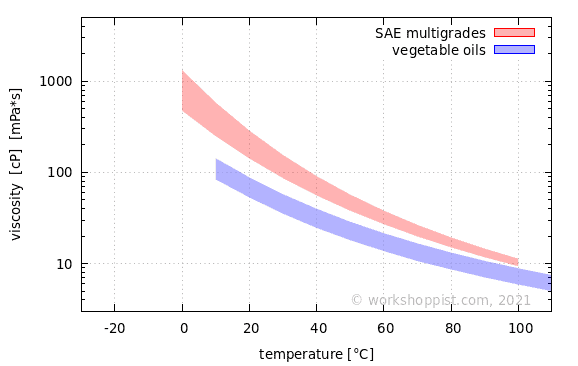Have you ever wondered if you really need to use purpose-made “Bar Oil” from Stihl or Husqvarna in your chainsaw oiler? Couldn’t more common (and potentially cheaper) oils be used as bar oil instead? Whether you want to save money or just avoid an extra trip to the local home center, these are reasonable questions.
In this article, I will tell you what kind of bar oil substitutes there are and which of them have the most potential. Many common vegetable oils, engine oils and hydraulic oils can be used for lubricating the chainsaw guide bar and chain. Bar oil alternatives vary in performance, service temperature range and chemical stability, but only the lowest-cost vegetable oils are actually cheaper than commercial bar oil products and make for an economically attractive replacement.
Next we will look at what kinds of oils would work as bar oil, rank the options by cost, and discuss two of the most popular oil groups: vegetable oils and engine oils. If you’re new to chainsaws, you may want to start by checking my article on bar oil basics.
Cost of oils
Low cost is probably the #1 quality that we are looking for from a bar oil alternative. We can therefore start by listing and ranking commonly available oils by cost.
The price point to beat is around $10 per gallon – this is the price of the most affordable commercial bar oils (at ~1 gal quantities). The table below lists bar oil candidates, each with a typical retail price range in one gallon quantity.
| BAR OIL CANDIDATE PRICES | Cost*, [$/gal] | Notes |
|---|---|---|
| Bar oils, commercial | 9…20 | |
| Vegetable oils | ||
| Canola oil (rapeseed) | 7…13 | very cheap |
| Corn oil | 8…16 | |
| Grapeseed oil | 30…50 | |
| Olive oil | 25…45 | |
| Peanut oil | 12…20 | |
| Soybean (“vegetable oil”) | 6…8 | very cheap |
| Sunflower oil | 18…29 | |
| Technical oils | ||
| engine oil, 4-cycle | 12…18 | |
| engine oil, 2-cycle, outboard | 14…20 | |
| engine oil, 2-cycle, air-cooled | 32…64 | |
| engine oil, used | 0 | |
| hydraulic oil | 14…26 | <$10 in large quant. |
| transmission fluid | 15…24 | |
| *July 2021 prices |
Vegetable oils: cost promise
In the table, we see that vegetable oils are the lowest cost oils. Canola oil and corn oil retail at as little as $7…8 per gallon; the real low-cost champion is soybean oil at $6 per gallon (usually sold as “vegetable oil”).
Swapping bar oil for any of these vegetable oils (canola, corn, soybean) could save you money. But some vegetable oils are more expensive than commercial bar oil: grapeseed, olive, peanut and sunflower oil do not make for an economical replacement.
No savings with engine oils
The table also shows that most technical oils are relatively high cost: on average they cost as much as bar oil or more.
Engine oils range from around $12 per gallon for the cheapest 4-cycle or water-cooled engine types to more than $50 per gallon for air-cooled 2-cycle engine oils. Hydraulic oils and transmission fluids are similar, ranging from $15 to $25 per gallon.
This means that most oils for vehicles and machinery are in fact more expensive than commercial bar oil products, and using them as bar oil makes little economic sense.
(The exception is used engine oil, which is often available for free – $0 per gallon. The price point is unbeatable, but using such oil for your bar is usually not worth it; more on this below.)
Requirements for bar oil
The job of bar oil is to lubricate the chain–bar contact and thus help to reduce friction, wear and heat buildup in the bar.
What kind of an oil would work here? The minimal requirements for a bar oil substitute are:
- Lubricating: Moderate viscosity through the operating temperature range (not too thick, not too thin) – anywhere between 10…300 cP (mPa*s) is probably OK
- Clean and non-toxic: no solvents or particulate matter that would damage the oil pump, clog up channels or be very hazardous to the user or the environment
- Stable: no drying (polymerization) or decomposition in tank
- Low-cost: a bar oil substitute should cost clearly less than $10 per gallon
The requirements listed are not very tough: many common household and industrial oils qualify to serve as bar oil – at least in some use cases. Potential bar oil replacements include:
- Vegetable oils such as canola, olive and soybean oil,
- Engine oils, almost all types (except used oil)
- Hydraulic oils many other oils for technical uses.
All of the potential bar oil substitutes have different properties which play into when and how well they work as bar & chain lubricants.
Vegetable oils as bar oil
We saw that canola, corn and soybean oil would be economically attractive replacements of commercial bar oil. But how well do they work?
Good lubricity: Vegetable oils lubricate well as bar oil under typical temperatures.Vegetable oils all have very similar viscosity around 30 cP at a moderate bar temperature of 100 °F (40 °C). This is around half of that of common engine oils and a good value for lubrication. Vegetable oils also change their viscosity less with temperature, i.e. they have a high viscosity index (VI) – a desirable property similar to multi-grade oils.

Clean & non-toxic: Most vegetable oils in the grocery store are clean, non-toxic and safe to use – in fact they are usually edible. This means that as bar oil, vegetable oils are harmless to the chainsaw operator and the environment.
Poor stability: Chemical stability is the weak point of vegetable oils: they are prone to oxidation and polymerization which cause the oil to gum up or lose its lubricity. This means that vegetable oils go bad sooner than typical bar oil both in storage and in the saw oiler tank.
Stiff in the cold: Vegetable oils also have a higher pour point than most technical oils: i.e. they may start to crystallize and stop flowing in winter temperatures.
Low cost: Low price is the biggest strength of vegetable oils as bar oil. Available at $6 to $7 per gallon in small quantities, canola and soybean oil beat all technical oils in cost.
For more info on which vegetable oils are the best and when, check my dedicated article on the topic.
Engine oils as bar oil
Although engine oils provide no cost advantage over commercial bar oils, they do make for a decent lubricant for the bar and chain. Let’s take a quick look:
Good lubricity: Engine oils lubricate well as bar oil in normal and hot operating conditions. The viscosity varies with SAE grade, but averages around 70 cP at 100°F (40°C) and 10 cP at 210°F (100°C) – these are OK values. Engine oils get stiffer than optimal in winter temperatures below 32°F (0°C); winter grades 0W and 5W are preferable in the cold.
Clean & non-toxic: Against popular belief, most engine oils are clean and non-toxic/minimally toxic. If you do not believe me, consult the Safety Data Sheets (SDS). If unnecessary spilling and skin/eye contact are avoided, they are safe to the user and the environment.
Excellent stability: Engine oils are very stable against degradation and have excellent shelf and tank life as bar oil. The chemical stability is engineered into these oils by refining the base oils and by the use of numerous additives (VI modifiers, pour point depressants, friction modifiers, anti-wear, anti-corrosion …).
High cost: Engine oils are pricey compared to bar oil. The refined base stock and extensive additives mean that engine oils (4-cycle) retail well above $10/gal (@ ~1 gal quantity) – despite the huge sales volumes. Two-cycle oil for chainsaw use is particularly expensive ($50/gal).
To sum up, engine oils perform well as bar oil but are not a very economical choice – they are too good for the job. However, engine oils make an excellent stopgap bar oil if you have some to spare. If you are planning to go ahead with engine oil, please check my article on engine oil as bar oil.
Used engine oil as bar oil?
Fresh engine oil makes for a good bar oil – used engine oil is another story.
While essentially free, used engine oil is a potentially compromised and probably toxic bar lubricant. Used engine oil is drained out of the engine for a reason: it has potentially accumulated too much impurities and lost too much of its additives to lubricate reliably. The VI improvers are particularly susceptible to breakdown.
Used engine oil has also picked up a multitude of toxic substances and particulate matter during use. Metal chips, soot, dissolved heavy metals and volatile organic compounds (VOCs) are on the top of the list. These are a hazard to the user, the environment and may also damage the bar oiler of your saw.
While the lowered lubricity is not a major issue, the impurities make used engine oil a risky bar oil – not worth the saved money in my opinion. (If you really want to save money, you’re better off with the cheapest canola oil, which will cost you around $0.50 per hour of sawing.)
Conclusion
There are indeed alternatives to the bar oil products: vegetable oils are both economical and ecological and engine oils are excellent if a bit expensive substitute.
For more information on the most popular bar oil alternatives, see my posts on engine oils and vegetable oils as bar oil. My article on the basics or bar oils covers composition, viscosity and relative cost, which you may also find interesting.
